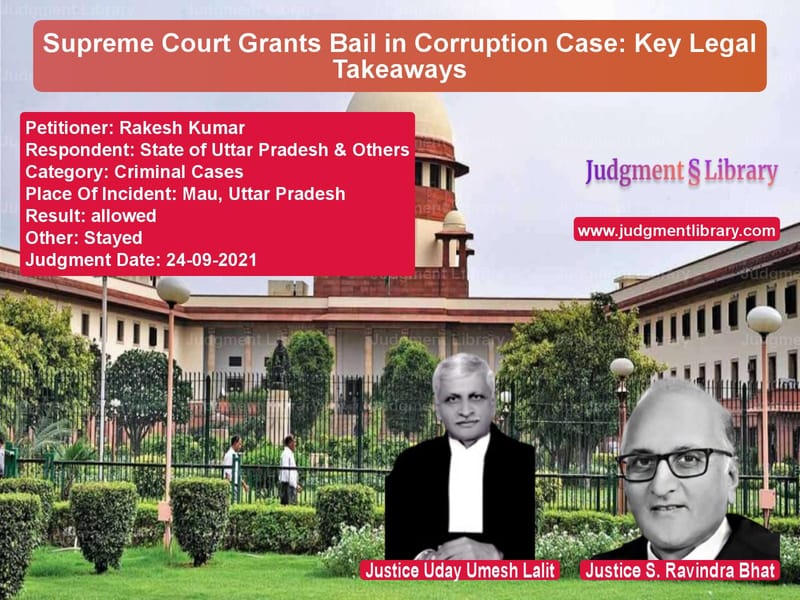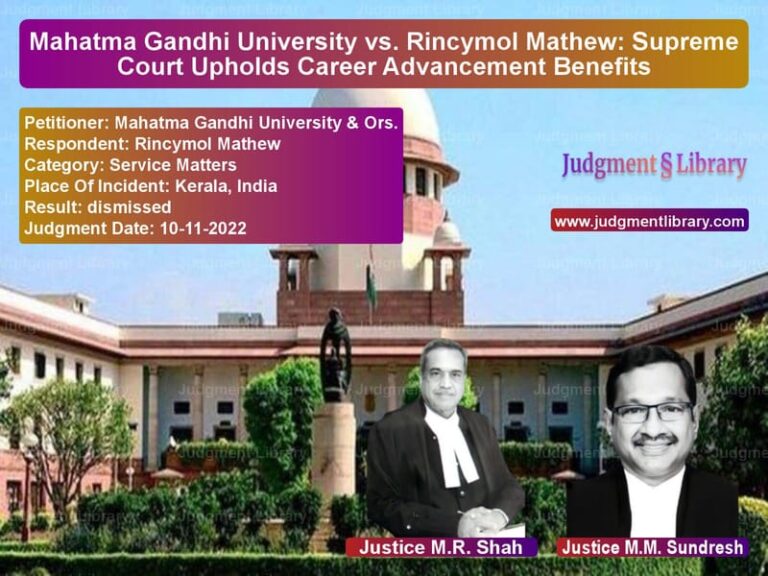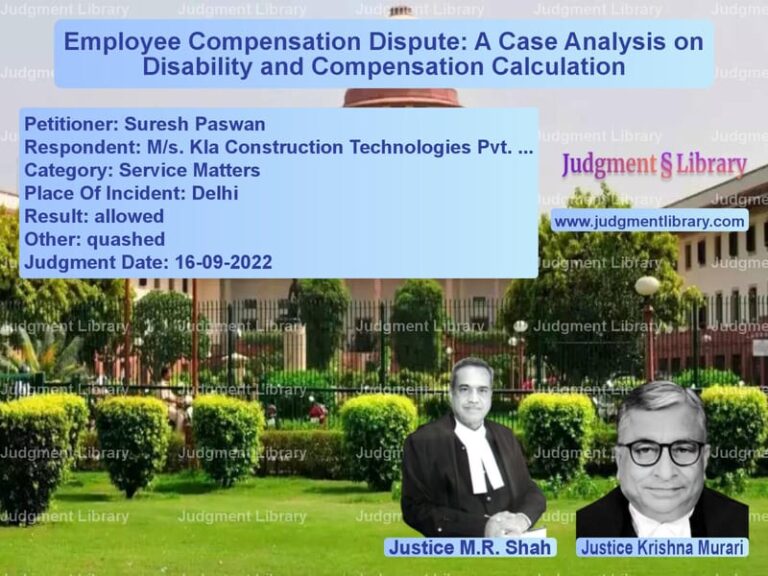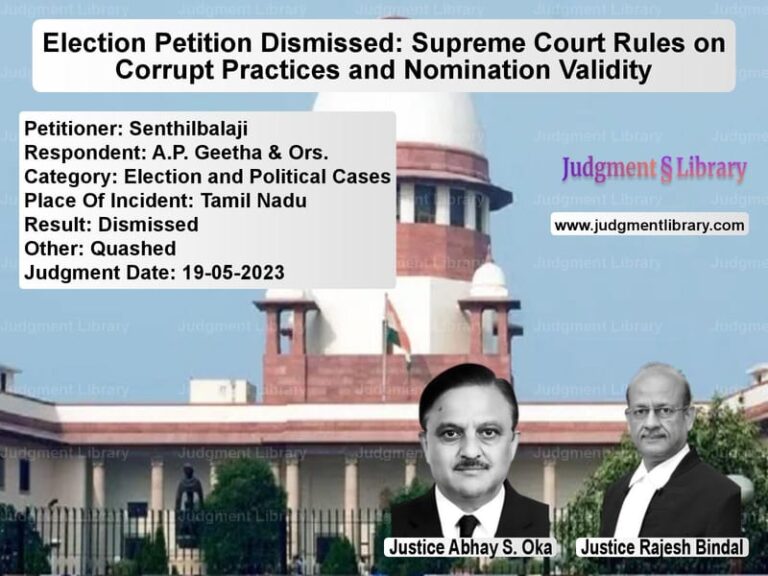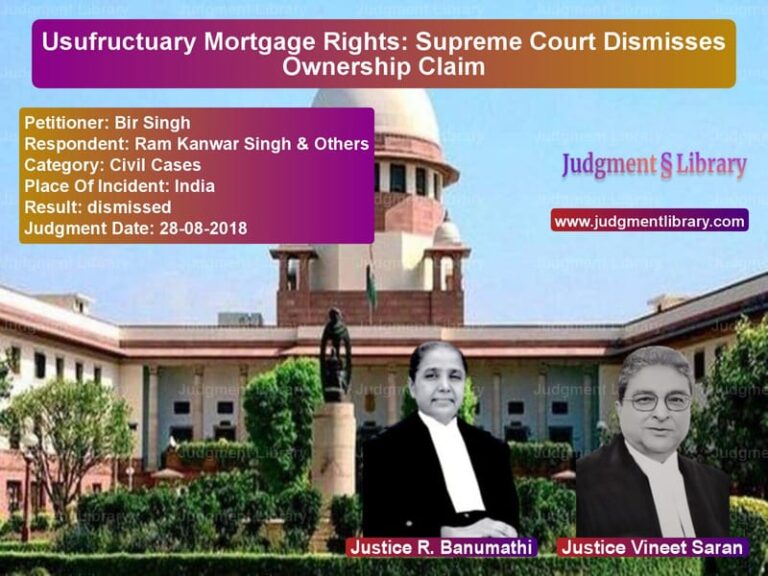Supreme Court Grants Bail in Corruption Case: Key Legal Takeaways
The Supreme Court recently delivered a significant ruling in the case of Rakesh Kumar v. State of Uttar Pradesh & Others, addressing the issue of bail in a corruption-related case. The case revolved around the Prevention of Corruption Act, 1988, and the question of whether the accused should be arrested after the completion of the investigation. This judgment clarifies the legal position on pre-trial arrest and provides important guidance on procedural fairness in corruption cases.
Background of the Case
The appellant, Rakesh Kumar, was accused under Sections 7, 13(1)(d), and 13(2) of the Prevention of Corruption Act, 1988. The First Information Report (FIR) No. 1470 of 2016 was registered at Police Station Kotwali Mau, District Mau, Uttar Pradesh, alleging that he had misused his official position for personal gain.
The appellant initially approached the Allahabad High Court through a writ petition seeking quashing of the proceedings. The High Court dismissed the petition, leading him to file a special leave petition before the Supreme Court.
Legal Issues Considered
- Whether the accused should be arrested after the completion of the investigation.
- Whether bail should be granted considering the circumstances of the case.
- The procedural safeguards available to an accused under the Prevention of Corruption Act.
Arguments by the Appellant
- The appellant contended that he had cooperated with the investigation and that there was no need for his arrest.
- He argued that the investigation had been completed and that non-bailable warrants had been issued against him without proper justification.
- His legal team emphasized that custodial interrogation was unnecessary as the charge sheet had already been filed.
- They sought relief from the Supreme Court to prevent unnecessary harassment and detention.
Arguments by the Respondent (State of Uttar Pradesh)
- The state argued that the charges against the appellant were serious and that judicial custody was necessary to ensure a fair trial.
- The prosecution contended that non-bailable warrants had been issued against the appellant due to his failure to appear before the investigating authorities.
- It was asserted that allowing bail at this stage might hinder the trial process.
Supreme Court’s Observations
The Supreme Court, comprising Justices Uday Umesh Lalit and S. Ravindra Bhat, carefully examined the submissions and the case history before delivering its ruling. The key observations were:
- The investigation into the crime was complete, and there was no immediate necessity for the appellant’s arrest.
- The appellant had approached the High Court seeking relief, which indicated that he was not absconding or evading the law.
- Considering the nature of the charges and the procedural safeguards available under the Prevention of Corruption Act, there was no justification for pre-trial detention.
- The Court reiterated that the purpose of bail is to ensure the presence of the accused in trial proceedings rather than to punish him before conviction.
Final Judgment
The Supreme Court allowed the appeal and passed the following directives:
- The appellant was directed to present himself before the trial court within seven days from the date of judgment.
- Upon his appearance, the trial court was instructed to release him on bail, subject to conditions ensuring his presence during trial proceedings.
- The bail conditions were left to the discretion of the trial court, with the expectation that they would be reasonable and proportionate.
Conclusion
This ruling reinforces the legal principle that arrest should not be used as a tool of coercion, especially when the investigation is complete and the accused has cooperated with legal proceedings. By granting bail, the Supreme Court ensured that due process was followed while also maintaining the integrity of the judicial process.
The judgment serves as an important precedent in corruption cases, particularly in the context of judicial discretion in granting bail. It highlights the need for a balanced approach in preventing undue hardship to the accused while ensuring justice is served.
Petitioner Name: Rakesh Kumar.Respondent Name: State of Uttar Pradesh & Others.Judgment By: Justice Uday Umesh Lalit, Justice S. Ravindra Bhat.Place Of Incident: Mau, Uttar Pradesh.Judgment Date: 24-09-2021.
Don’t miss out on the full details! Download the complete judgment in PDF format below and gain valuable insights instantly!
Download Judgment: rakesh-kumar-vs-state-of-uttar-prade-supreme-court-of-india-judgment-dated-24-09-2021.pdf
Directly Download Judgment: Directly download this Judgment
See all petitions in Bail and Anticipatory Bail
See all petitions in Money Laundering Cases
See all petitions in Fraud and Forgery
See all petitions in Judgment by Uday Umesh Lalit
See all petitions in Judgment by S Ravindra Bhat
See all petitions in allowed
See all petitions in Stayed
See all petitions in supreme court of India judgments September 2021
See all petitions in 2021 judgments
See all posts in Criminal Cases Category
See all allowed petitions in Criminal Cases Category
See all Dismissed petitions in Criminal Cases Category
See all partially allowed petitions in Criminal Cases Category

